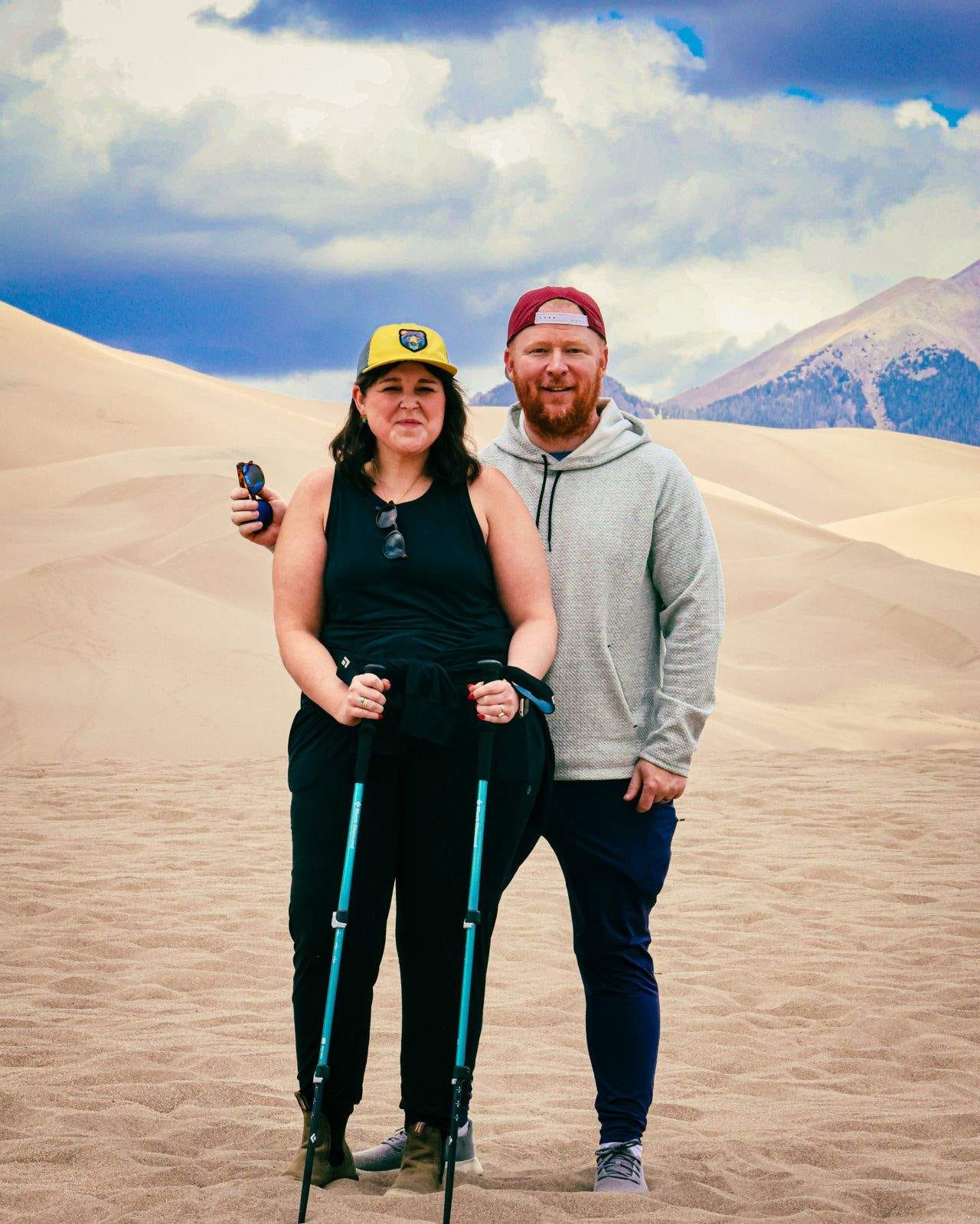**Content warning: suicidal ideation
You can have your movie scripts and stronger-than-thou myths about people who companion their disabled and vulnerable loved ones.
I don’t want it. I can’t survive in that story.
I am split open by my own sadness more often than I could even conceive of “strength.”
We are co-broken.
Co-exhausted.
Co-emptied.
And yet. My story contains the arc of being branded with the plight of goodness—a sturdy soldier people can rely on when the going gets tough. It’s true. I’ve worn the cape. It would be more accurate to say that for years, the cape was just a weighted blanket I hid under to avoid being noticed as wholly afraid, barren and bereft.
My marriage, which has included living with sickness from day one, has been the soil that sifted all of my idyllic dreams about raising a family or enjoying our early years together. Approaching fifteen years in, there is no family to raise. Our ‘early years’ have been years of surviving. At times my wife would tell you, frankly, she’d rather not. There has been more than one occasion I’ve had to keep her safe from grasping for what felt like the only means of -finally- relieving the pain.
><
I remember about three years into marriage c. 2013, KJ & I met with a sweet older couple who was full of kindness. They knew grief and they had their own disability in the family to navigate. The focus of much of our conversation that evening was not about KJ—her illness or her needs. It was about how depressed I felt. They took the time to listen closely to me share about my own pain, how caregiving was affecting me, and how scary and unfamiliar the waves of sadness felt. The husband looked at me tearfully at one point and said, “Ryan, if you weren’t depressed given what you guys have been through, I would be concerned.”
We look back on that evening as one of the first major shifts in our relationship—where we began to relate to one another in the pain we shared, even if our pains were different.
In the years since, I have met many seasons with varying degrees of depression and anxiety. Most of the time it is grief finding a way to voice its own dignity and refusing to be buried. I have finally begun to grace the assertion.
><
However you prefer to describe the process of examining and unlearning faith—faith as it was handed to you, faith as it was conditioned in you, faith you made your own—I describe it as grief.
Sorrow asks me to appropriately honor what I’ve lived. What I’ve lived has fundamentally altered my internal structures, which includes spirituality. Parts of my faith, then, died of natural causes. What is left, is left in union with grief.
Perhaps for some, this process of unlearning and un-binding ourselves from former structures of belief is primarily an intellectual endeavor. More commonly, I suspect, it is a process of adaptation and renewal. Life, especially the brutality therein, invites us to shed many constructs of belonging that prove themselves bankrupt.
Contrary to the derision of some, it is not ‘moral rebellion’ or waywardness that usually compels people to walk away from faith, or at least, their faith of origin. It is integrity. People will make pilgrimage to whatever terrain is necessary for their healing.
Yes, we have the capacity for self-destruction and self-sabotage, but this is not the predominant reason most folks “deconstruct” their faith. They deconstruct because the faith they encountered was destructive to themselves and others.
><
“The Strong and the Sick” is not a sustainable pairing for any relationship, nor is it humane.
embodies strength—let’s call it virtue, or courage—through her physical limitations in ways that leave me stunned. She also has longings and gifts to share with the world that have nothing to do with her illness.I embody virtue when the weight of powerlessness I feel is measured with tears. My wife nor anyone else needs me to save them. I have longings and gifts to share with the world that have nothing to do with my caregiving.
We don’t have roles. We have selves. We don’t have fixed identities. We have lives unfolding that deserve our full attention.
Our love has deepened the more we’ve lost. That does not make us superior to anyone. Some of the very best people we know lost their marriages. And marriage itself is not a standard or even a goal of human fulfillment. It’s just the context of our particular journey.
Even in the last year+ of medical trauma and ongoing upheaval, the gift we’ve received has been this latest iteration of -us-. It’s the together-ness. Neither of us really understand why. It could have gone the other way, right? People drift apart and relationships rupture all the time—with or without any external crisis.
The below lyrics by Sam Lynch aptly describe the beauty we have found even as all the hard continues to bear down on us. I do not want to project strength. Not in my marriage. Not in my work as a hospice chaplain. Not in my advocacy for those harmed by faith systems. I want to show up tender, present, and receptive in my body’s own need for care.
You can tell when something's wrong
I'm halfway here and I'm halfway gone
A puzzle-master putting all the pieces into placе
You say
I'm not giving up on you, I'm not giving up on you
I'm not giving up
And if you go down again
I will always find your hand
Like a moth that can't forget the outlinе of a flame
We can dance till it shakes our core
Barefoot on a wooden floor
And I'll pull out the splinters, till it doesn't hurt
At all
I'm not giving up on you
I'm not giving up on you
I'm not giving up






You made me cry. I love you, forever.
“We don’t have roles. We have selves. We don’t have fixed identities. We have lives unfolding that deserve our full attention.”
I can’t even with how much I needed these words today. Thank you, for in honouring your full self and your body’s needs you gave me an open door to do the same.